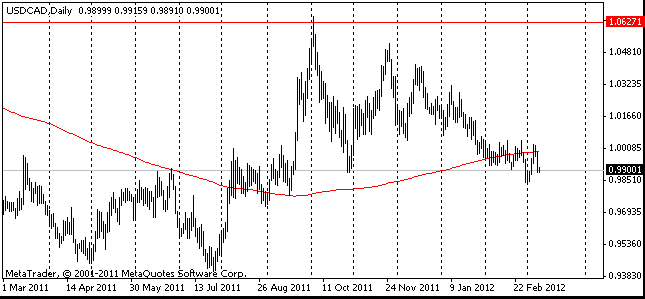EUR/usd
‘Hedging failed' – that's the way Jamie Dimon, JPMorgan CEO, has described the trading loss of $2bln. In fact, the losses will hardly end there and in this quarter there will be further losses resulting from market volatility. Some especially meticulous analysts suppose that the company will possibly lose another $3bln. It's a hard blow for the reputation of the company and its managers. Such unexpectedly bad news not only put pressure on the stocks at the end of the American session, but also can become an eventful moment in the fight of investors against Walker's rule. All this may or may not have far-reaching consequences. However, the fact is that the single currency has again rewritten another local low. To be honest, for the three consecutive years the beginning of May has been associated with the massive euro sales. But even despite the drop the single currency looks more confident than in 2010 and 2011. Those years the difference between the max and min levels made 10 points in the first two weeks of May. This time the euro has sunk only by 4 points. Well, not bad for the barely alive euro. This week the markets are to plunge into the disturbing time of teetering on the brink, when decisions concerning Greece may be taken just a few hours before the deadline. Today is the last day when the Greek parties will try to form the coalition. If there is no coalition formed, the president of the Republic will have to announce the rerun of elections.

GBP/USD
Yesterday we proved to be wrong in regard to the BOE's actions. The Bank preferred to do nothing, keeping the size of the QE programme at the level of £325bln. Thought it coincided with the consensus forecast, the markets reacted with buying of the pound, which lifted the pair from 1.6110 to 1.6180 at the height of the American session. However, the optimism didn't persist for long and the growth turned out to be speculative. By now the British pound has gone down to Thursday's lows and is trading close to 1.61. Even the euro managed to outrun the cable earlier today. The euro/pound is bouncing off 0.80, though over the eight recent trading sessions it has taken three attempts to drop lower. We still consider the euro/pound oversold, but in our opinion it will hardly be the euro to provide the impetus for growth in the pair. Most likely, the growth will be triggered by the sterling's failures. The news from JPMorgan, the massive rating revision expected from Moody's and also the news in the press concerning the need of businesses for £28 trln to refinance their old borrowings – all this aggravates the weakness of the pound. Very often the issues in the banking sector severely hit the British currency.

gold
Having ceased to be the hottest and most desired instrument, Gold is gradually giving up its positions. Despite the across-the-board risk aversion this week has marked the slump below 1600 in the price of this precious metal. The support level, which persisted since October 2008, has been broken. Soros called Gold a mega-bubble and, probably, it is a correct reflection of the present-day investor sentiment. Investors want to make a profit with the help of the metal, but tend to achieve the safety of assets, buying the government bonds of the USA, Japan, Britain and Germany. The only thing that can revive the demand for Gold now is new emissions from the largest CBs. And there's no one but Japan to do that at the moment.

USD/CAD
Those two weeks of May, which were quite unfavourable for the euro, proved to be very successful for the Loonie. USD/CAD rushed from the 0.98 level up above the parity and is now trading at 1.0040. This strong movement, which has driven the pair almost to its 200-day moving average, brings to naught the more than 2-month consolidation and the three-week downward anti-rally, that's been in place since the second decade of April. It's more so disappointing for Loonie-bulls that the reasons are generally not in the weakness of the Canadian economy, but mainly in the resumed risk-aversion and decline in commodity prices.
